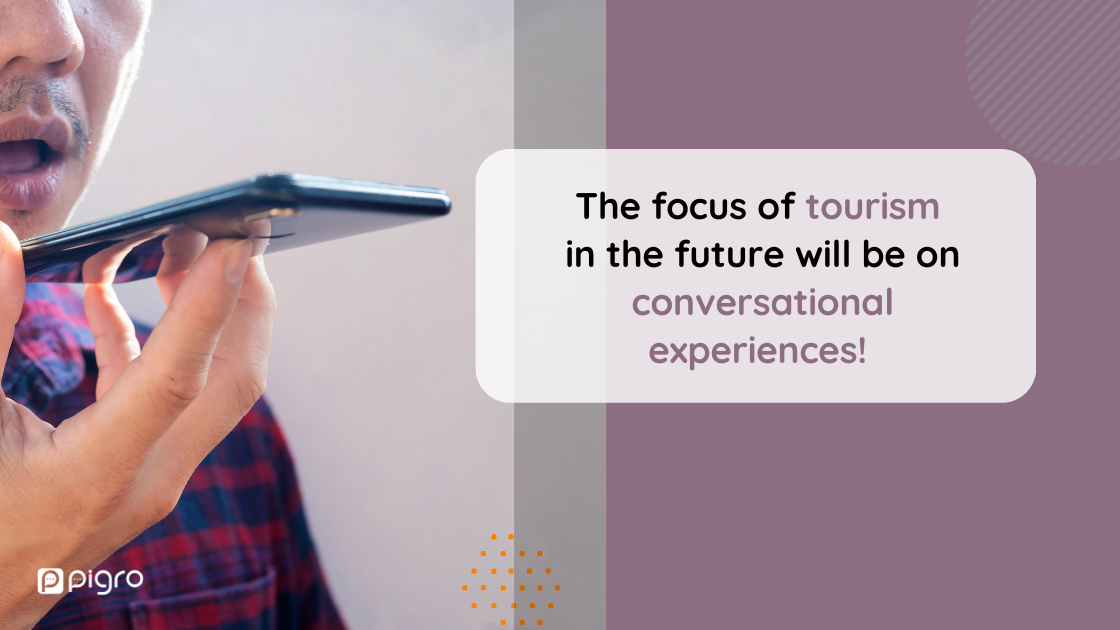The incorporation of technology in the tourism industry is truly revolutionizing customer experiences and streamlining operations, with artificial intelligence, virtual reality, and data analytics at the forefront.
This embrace of technology is paving the way for a future of endless innovation and seamless traveller experiences.
The seamless integration of technology in tourism holds immense potential for elevating customer satisfaction and propelling the industry towards new heights.
The Emergence of Conversational Interfaces Transforming the Tourism Industry
In today's technology-driven era, the tourism sector is also being transformed. A recent study by Gartner predicts that 85% of interactions in the tourism industry will soon be handled by conversational interfaces powered by Artificial Intelligence, eliminating the need for human assistance. These conversational interfaces not only reduce waiting times but also enhance customer satisfaction.
The integration of generative Artificial Intelligence in the travel industry brings numerous benefits, including improved service levels, increased operator productivity, and personalized offers and user experiences.
Unleashing the Power of Generative AI to Enhance Personalized Experiences and Drive Optimal Services
Generative AI is revolutionizing the tourism industry, transforming the overall consumer experience and becoming a crucial ally for the hotel sector.
From the moment of booking to the stay itself, AI enhances user satisfaction and provides valuable data for continuous service improvement.
According to a survey by Userlike, 68% of users appreciate the convenience and speed of conversational interfaces. Not only do these interfaces benefit customers, but they also have a positive impact on suppliers by reducing costs and minimizing the need for additional employees.

A study by Juniper Research estimates that interactions based on conversational interfaces will double retail sales annually, reaching an astounding $112 billion by 2023. This exponential growth is a testament to the power of conversational AI in transforming the way customers engage with businesses in the tourism industry. As these interfaces become more advanced and sophisticated, they will undoubtedly become the primary mode of interaction for customers, surpassing traditional methods of communication.
The convenience and efficiency offered by conversational interfaces are unmatched.
Customers can effortlessly make bookings, inquire about travel destinations, and receive personalized recommendations, all through a simple conversation with an AI-powered chatbot. This not only saves time but also enhances the overall customer experience, making it more seamless and enjoyable.
Moreover, the integration of conversational interfaces in the tourism industry opens up new opportunities for businesses to upsell and cross-sell their products and services. With access to valuable customer data and preferences, AI-powered systems can tailor their recommendations and offers to individual customers, increasing the likelihood of conversion and driving revenue growth.
The potential for conversational interfaces to revolutionize the tourism industry goes beyond just customer interactions. These AI-powered systems can also assist businesses in streamlining their operations and improving internal processes. From managing inventory and tracking customer preferences to optimizing pricing strategies, conversational interfaces can provide valuable insights and support decision-making, ultimately leading to improved efficiency and profitability.
As the tourism industry continues to embrace technology, the adoption of conversational interfaces powered by generative AI is poised to reshape the way businesses and customers interact. With the potential to double retail sales and enhance customer satisfaction, it is clear that conversational interfaces are a game-changer for the industry. By harnessing the power of AI, businesses can unlock endless possibilities and create truly personalized experiences for their customers.
The future of the tourism industry is undoubtedly conversational, and those who embrace this technology will thrive in the evolving landscape.
However, let's delve into the fascinating world of conversational interfaces and explore how they function.
Conversational interfaces are a type of Artificial Intelligence that has been programmed to engage in conversations with users. These interfaces facilitate a natural flow of conversation by processing and understanding the language used by people in their everyday lives.
By analyzing the received data in the form of questions, these conversational interfaces utilize advanced algorithms and machine-learning techniques to reconstruct the context and intent of the question. Through their extensive training, these interfaces
The power of conversational interfaces lies in their ability to understand the nuances of human language and adapt their responses accordingly. They can interpret the underlying meaning behind a question, taking into account the user's preferences, previous interactions, and even their current location or situation.
This level of understanding allows the interfaces to deliver highly targeted and accurate information, enhancing the overall user experience.
Furthermore, these interfaces continuously learn and improve over time. As they interact with more users and receive feedback, they can refine their responses and become even more adept at understanding and addressing user queries. This constant learning and adaptation ensures that the information provided remains up-to-date and relevant, keeping pace with the ever-changing landscape of the tourism industry.
In addition to providing valuable information, conversational interfaces also can engage in dynamic and interactive conversations with users. They can ask follow-up questions to clarify any ambiguities, provide additional recommendations, or even engage in small talk to create a more natural and conversational experience. This level of interactivity adds a personal touch to the interaction, making users feel more connected and engaged.
Overall, the ability of conversational interfaces to analyze and interpret user questions, and provide relevant and valuable information based on their training, is a game-changer in the tourism industry. It allows for more intuitive and personalized experiences, empowering users to make informed decisions and enhancing their overall satisfaction. As technology continues to advance, we can expect conversational interfaces to become even more sophisticated, revolutionizing the way we engage with businesses in the tourism sector.
Conclusion
Conversational interfaces are revolutionizing the tourism industry by providing a seamless and interactive platform for customers to access information, make bookings, and receive personalized recommendations.
With the power of artificial intelligence and machine learning, these interfaces can deliver highly targeted and accurate information, greatly enhancing the overall user experience.
By reducing waiting times and offering unmatched convenience and efficiency, conversational interfaces are increasing customer satisfaction.
The integration of these interfaces is paving the way for personalized and tailored travel experiences, setting a new standard of service in the industry.
As technology continues to advance, these interfaces will become even more sophisticated, transforming the way people engage with the tourism industry.
Read also:
- Focus on Knowledge Management: how to automate the management of information
- Open innovation: how knowledge management supports open innovation
Do you want more information about Pigro? Contact us!



